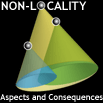Speaker
Leonardo Modesto
Description
I introduce a perturbatively super-renormalizable and
unitary theory of quantum gravity in any dimension D
starting from the four dimensional case. The theory
presents one entire function, a.k.a. "form factor", and a
finite number of local operators required by the quantum
consistency as well as unitarity of the theory itself.
The theory is power-counting renormalizable at one loop
and finite from two loops upward.
I essentially present three classes of form factors,
systematically showing the tree-level unitarity. It is right
now under investigation a possible N=1 supersymmetric
extension of the theory in four dimensions. Preliminary
results indicate that the nonlocal supergravity theory is
power-counting super-renormalizable and tree level
unitary with the same particle content of the local N=1
supergravity. In contrast to the local (quadratic-)higher
derivative supergravity in its nonlocal generalization all
the states fill up in N=1 supergravity multiplet. We
believe that the extended SO(N) supergravity, for N=4
and/or N=8, can be off-shell divergence-free also at one
loop. At semiclassical level the gravitational potential is
regular in r = 0 for all the choices of form factors
compatible with renormalizability and unitarity. For two
out of three form factors the black hole solutions are
regular and the classical singularity is replaced by a "de
Sitter-like core" in r=0.
For one particular example of form factor, I prove that
the D-dimensional "Newtonian cosmology" is singularity-
free and the Universe spontaneously follows a de Sitter
evolution at the "Planck scale" for any matter content.
I conclude stating that, in the ultraviolet regime, the
spectral dimension takes on different values for the
three cases: less than or equal to "1" for the first case,
"0" for the second one and "2" for the third one.
Once the class of theories compatible with
renormalizability and unitarity is defined, the spectral
dimension has the same short-distance "critical value" or
"accumulation point" for any value of the topological
dimension D.

